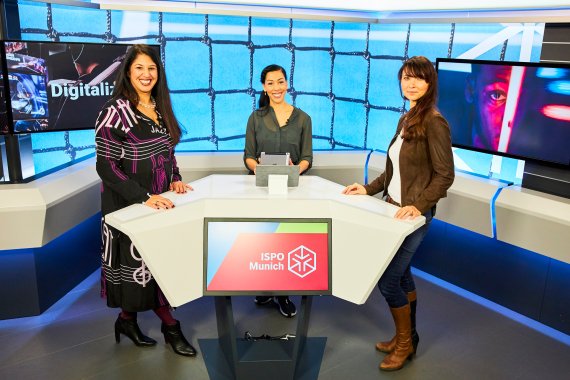
The Network 'Frauen verbinden' has long been an institution at ISPO Munich. Because it should also not be missing at ISPO Munich Online, moderator Jennifer Sarah Boone invited to the "Women Empowerment Panel" in the studio on Tuesday. Four digital professionals discussed the question: Was it beneficial for women's careers that the Corona pandemic gave digitalization a boost?
If the spread of the Corona virus had one good thing going for it, it was this: the pandemic spurred the digitalization of the workplace. Bosses for whom home office employees were previously unthinkable now find it natural for everyone to work at home. Video meetings with colleagues have become the norm. And the arrangement of working hours at home is more flexible than ever before. What does this mean specifically for women? Does it have advantages for their careers or even disadvantages?
Sabine Seymour, CEO and founder of SUPA in New York, has been working flexibly and digitally for a long time, she reports: "For me, this was a given even before Corona. The fact that many more people are now able to work virtually from anywhere is extremely positive. The physical and digital worlds have moved closer together because of Corona. People are now going digital who previously had nothing to do with it. It's been a leap forward."
"We've all learned so much in the past few months," confirms Deepa Gautam-Nigge, Global Lead SAP Next-Gen Ecosystem at SAP. "Just how many tens of different tools we now use for online collaboration as a matter of course!" The word "digitalization" is a buzzword, finds Anna Kopp, IT Director at Microsoft. "But we are still at the beginning of this journey."
For women, the development is an advantage, Kopp thinks: "Combining life with work and family with career has become easier in the past year. Many women can now work where and when they want." However, the more digital the working world, the more important transparency is, Kopp stresses: "The fact that everyone works when they can do it best will be groundbreaking for years to come. But everyone has a different workstyle - and it needs to be manageable for others to make it work."
SAP's Gautam-Nigge confirms, "Transparency is indeed still lacking. It is important to gain trust - for example, trust from employers that everyone can do their work at home.

Dr. Jeanette Friedrich, Global ISPO Group Director at Messe München, appreciates the flexibility of the home office above all. "There are now many more networking opportunities for women." However, she says there is still a lack of female role models. "We are going in the right direction, but we still have a long way to go."
What Friedrich would also like to see: more support from men. "After all, this is not a war between the sexes that we are waging here, on the contrary: we should support each other. Then we all benefit." Friedrich, who has been part of the ISPO Group since 2019, experienced support from men herself: "There were some who supported my career and encouraged me. And that's what all men should do - for their wives and their daughters."
This includes, adds Anna Kopp of Microsoft, men being supported by their employer: "Staying at home and looking after the children should be possible for men if they want to. That's feminism too, because it supports women." For men who want to stand by women but don't quite know how, Kopp suggests the organization "He for She" where men can find answers to all their questions."
Asked about the women's quota in Germany, Kopp says: "I love it! It's the only way to get the role models we desperately need." Sometimes, though, Kopp says, companies should put more work into finding the best woman for a job "instead of hiring another Thomas or Michael."
The same goes for diversity, adds Gautam-Nigge, Global Lead SAP Next-Gen Ecosystem at SAP: "Of course, it's easier to hire a mini-me than someone completely different from you. But it takes different perspectives and experiences on the team! Everyone who helps decide whom to hire should challenge their thinking and ask themselves: what skills do I really need to complete the team? That's the only thing you should be looking for."
According to Gautam-Nigge, the much-needed diversity and gender processes are still in a transitional phase, "because we're dealing with people. And people are afraid to change existing things. We should take these fears seriously and be sensitive to the needs of everyone involved - including men."
To integrate as many cultures and backgrounds as possible in the future, SUPA CEO Sabine Seymour recommends harnessing creativity and innovation and restructuring companies where necessary.
"Managers should ask their employees how they can work best - and then enable them to do so. I, for example, work best where I can also do my sport," says the passionate golfer, skier and snowboarder.
 Sports BusinessThe future of the bike industry: 6 innovative bike stores
Sports BusinessThe future of the bike industry: 6 innovative bike stores
- ISPO awards
- Mountain sports
- Bike
- Design
- Retail
- Fitness
- Health
- ISPO Job Market
- ISPO Munich
- ISPO Shanghai
- Running
- Brands
- Sustainability
- Olympia
- OutDoor
- Promotion
- Sports Business
- ISPO Textrends
- Triathlon
- Water sports
- Winter sports
- eSports
- SportsTech
- OutDoor by ISPO
- Heroes
- Transformation
- Sport Fashion
- Urban Culture
- Challenges of a CEO
- Trade fairs
- Sports
- Find the Balance
- Product reviews
- Newsletter Exclusive Area
- Magazine




